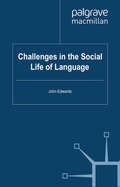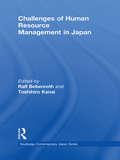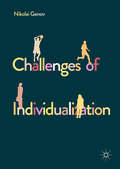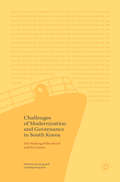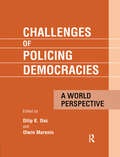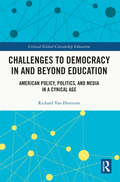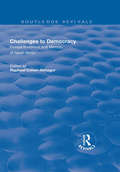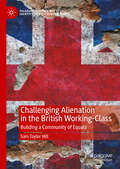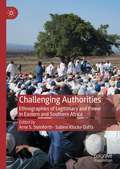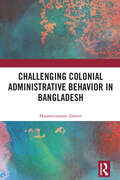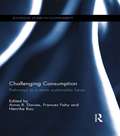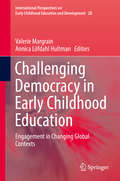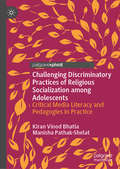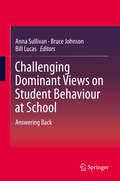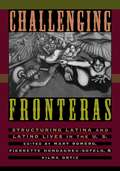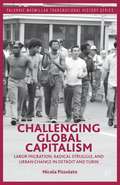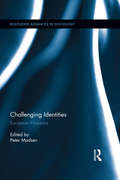- Table View
- List View
Challenges in Human Rights: A Social Work Perspective
by Elisabeth ReichertBy using human rights as a guidepost, social workers can help create social welfare policies that better serve societal needs. However, in applying human rights to contemporary situations, social workers often encounter challenges that require thinking outside the box. Bringing together provocative essays from a diverse range of authors, Elisabeth Reichert demonstrates how approaching social work from a human rights perspective can profoundly affect legislation, resource management, and enforcement of policies. Topics include the reconciliation of cultural relativism with universal human rights; the debate over whether human rights truly promote economic and social development or simply allow economically developed societies to exploit underdeveloped countries; the role of gender in the practice of human rights; the tendency to promote political and civil rights over economic and social rights; and the surprising connection between the social work and legal professions.
Challenges in the Process of China’s Urbanization
by Karen Eggleston, Jean C. Oi, and Wang YimingThe same institutions that enabled China's massive urbanization and spurred its economic growth now require further reform and innovation. To address the issues facing the next phase of the nation's transformation, the National New Urbanization Plan (2014–20) set ambitious targets for sustainable, human-centered, and environmentally friendly urbanization. This volume explores the key institutional and governance challenges China will face in reaching those goals. Its policy-focused contributions from leading social scientists in the United States and China explore aspects of urbanization ranging from migration and labor markets to agglomeration economies, land finance, affordable housing, and education policy. Subjects covered in the eleven chapters include: Institutional problems leading to fiscal pressures on local governments and unequal provision of social services to migrant families The history of land financing and threats to its sustainability The difficulty of sorting out property rights in rural China How administrative redistricting has allowed the urbanization of geographical administrative places to outpace the urbanization of populations within those areas How the hukou system may not be the sole, or even primary, mechanism restricting migrants from public goods, such as their childrens' education Whether the nation's food security is threatened by its ongoing urbanization The current state of the provision of low-income housing, and future challenges
Challenges in the Social Life of Language (Language and Globalization)
by John EdwardsThe first book to highlight the most pressing sociology-of-language themes of our times. All of which have to do with the twin issues of power and identity . Important evidence and illustrations bearing upon these matters are provided and supplemented by an extensive bibliography.
Challenges of Globalization and Prospects for an Inter-civilizational World Order
by Ino RossiAn encyclopedic coverage of regions and issues, some of the best scholarship in the field, and an emphasis on solutions make this book an important contribution.” Miguel Angel Centeno, Princeton University“Exceptionally diverse and comprehensive… [this] is certain to become an essential reference work on the economic, moral, human rights and civilizational aspects of globalization.” Daniel Chirot, University of Washington“…a much-needed comprehensive, updated, and non-Western-centric introduction to the origins, dynamics, and latest trends of globalization as seen from the perspectives of Global North and South.” Ho-fung Hung, Johns Hopkins University“..a timely and solid overview of the key theoretical and methodological challenges faced across the social sciences as we seek to understand the possible futures of globalization.” Roberto Patricio Korzeniewicz, University of Maryland“Ino Rossi has brought together a range of authors covering multiple aspects of our current condition. This diversity of engagements is what we need to sort out our major challenges.” Saskia Sassen, Columbia University"It is the best collection of studies on ecological globalization, latest impact on the Global South, millennia ascent of individual rights, and alternative designs of the future world order." Alvin Y. So, Hong Kong University of Science and TechnologyThis is a must-read volume on globalization in which some of the foremost scholars in the field discuss the latest issues. Truly providing a global perspective, it includes authorship and discussions from the Global North and South, and covers the major facets of globalization: cultural, economic, ecological and political. It discusses the historical developments in governance preceding globalization, the diverse theoretical and methodological approaches to globalization, and analyzes underdevelopment, anti-globalization movements, global poverty, global inequality, and the debates on international trade versus protectionism. Finally, the volume looks to the future and provides prospects for inter-civilizational understanding, rapprochement, and global cooperation. This will be of great interest to academics and students of sociology, social anthropology, political science and international relations, economics, social policy, social history, as well as to policy makers.
Challenges of Human Resource Management in Japan (Routledge Contemporary Japan Series)
by Ralf BebenrothHuman resource management systems differ across corporations around the world. Japan has unique characteristics that create specific challenges for HRM and there is currently a lack of research focusing on Japanese HR issues available to westerners. This book examines the major challenges and dilemmas in human resource management as Japan's industrial society continues its resurgence in the global arena. The first part of the book deals with Japanese HRM from an international perspective, analysing the overall structure of Japanese HRM systems and comparing these with current international systems. The second part of this book looks at Japanese HRM from a domestic perspective and as such covers the micro issues of HRM practice in Japan. Written by a leading team of HRM experts from Japan, the UK, France, Australia and Canada, this book will be of interest to anyone interested in HRM in Japan, and international HRM more generally.
Challenges of Individualization
by Nikolai GenovThis book critically engages with a series of provocative questions that ask: Why are contemporary societies so dependent on constructive and destructive effects of individualization? Is this phenomenon only related to the ‘second’ or ‘late’ modernity? Can the concept of individualization be productively used for developing a sociological diagnosis of our time? The innovative answers suggested in this book are focused on two types of challenges accompanying the rise of individualization. First, that it is caused by controversial changes in social structures and action patterns. Second, that the effects of individualization question varieties of the common good. Both challenges have a long history but reached critical intensity in advanced contemporary societies in the context of current globalization.
Challenges of Modernization and Governance in South Korea
by Jae-Jung Suh Mikyoung KimFocusing on the sinking of the Sewol, a commercial ferry which capsized off the South Korean coast in April 2014, this book considers key issues of disaster, governance, civil society and the ideational transformation of human agents and their empowerment. Providing a lens through which to re-examine South Korean institutions, laws and practices, the volume examines the impact of the Sewol incident and what it reveals about the fault lines of South Korean society and governance. It addresses the repercussions of South Korea’s turn to a liberal democracy and neoliberal economy and reflects on the multilayered implications of the disaster in respect to the potential human costs of the country’s state-driven development policy and high stress modernisation. The book also highlights the relevance of the Korean experience for other societies on a similar developmental trajectories and facing similar challenges.
Challenges of Policing Democracies: A World Perspective
by Dilip Das Marenin OtwinIn this text, the editors analyze the diverse situations that police forces operate under and the challenges that they face in different kinds of democracies. This cross-cultural comparison of various systems highlights the universal observation that police are a anomaly in a democracy and explores how various influences-for example, large-scale social violence, a zeal for crime fighting, and vulnerability to temptation-often find police incapable of behaving in a democratic manner. Challenges of Policing Democracies goes beyond just showing the similarities and differences of the policing challenges democratic societies face, it also examines the responses and remedies adopted by police in various countries at different levels of democratic achievement and how every society struggles with the challenges of preserving democratic values without sacrificing the effectiveness of policing.
Challenges to Democracy In and Beyond Education: American Policy, Politics, and Media in a Cynical Age (Critical Global Citizenship Education)
by Richard Van HeertumThis book explores political cynicism as a driving force at the heart of the current crisis of democracy in the United States, focusing on the crisis and the role of education, popular culture and news media in fostering and fighting cynicism. In this unique text, Van Heertum draws on historical and contemporary data, policy, and current events to map the growth of a cynicism that risks undermining the democratic principles upon which American society is built. Tracing the philosophical, social and historical origins of an “ubiquitous cynicism” cultivated in political discourse, media and educational policy, the chapters then explore avenues to challenge cynicism and restore hope through a more affirmative discourse, aesthetic education, media and educational reform, challenging rampant inequality, and methods to rein in corporate power. The book ultimately advocates for a radical democracy that can restore the power of the people to have a meaningful say in the decisions that affect their lives. A timely and useful contribution to the field of education, this book will be of interest to postgraduate students and researchers in the fields of educational policy and politics, the sociology of education and American studies.
Challenges to Democracy: Essays in Honour and Memory of Isaiah Berlin
by Raphael Cohen-AlmagorThis title was first published in 2000: The essays gathered in this volume cover a wide range of theoretical and practical issues concerning a variety of problems which democracies confront time and again. Their aim is to look at challenges to democracy that evolve from within democracy. The discussion sets out to examine how democracies, in different times, dealt with attempts to undermine democratic processes and fundamental human rights. The design of the book is both interdisciplinary and comparative, offering historical, philosophical, legal, sociological, political and media perspectives of renowned scholars from the UK, Israel, the USA and Canada. They analyze how different societies try to cope with and find answers for attacks against them by political extremists, cultural chauvinists, terrorists, hate groups and other radical movements.
Challenges to European Welfare Systems
by Klaus Schubert Paloma De Villota Johanna KuhlmannThis book provides the first comprehensive analyses of the challenges all European welfare systems have been facing since 2007, combining in-depth country-based studies and comparative chapters. It identifies four main challenges for European welfare systems: 1) the economic and financial crisis, 2) demographic change, 3) the balance between avoiding risks and opening up opportunities in social policy, and 4) legitimacy. It shows that European welfare systems tend to face the same challenges but in different ways and that, accordingly, their responses to those challenges differ considerably. Although the EU also plays a part in shaping national welfare systems, it becomes evident that European welfare systems are by no means converging: in terms of social policy, national diversity within Europe is still a major factor that will shape future developments in European welfare systems.
Challenges to the Swedish Welfare State (EPub)
by Desmond Lachman Robert P. Hagemann Adam Bennett J. H. Green Ramana RamaswamySweden's economy in the early 1990s has been characterized by a deep recession, high unemployment, a ballooning public sector budgete deficit, and a decline in the value of the currency- developments that have raised questions about the country's capacity to sustain its comprehensive welfare state. This study provides an analysis of recent economic developments in a longer-term context and assesses their implications for future policies.
Challenging Alienation in the British Working-Class: Building a Community of Equals (Palgrave Politics of Identity and Citizenship Series)
by Sam Taylor HillThis book explores the possibility of alienation amongst the British working-class and argues that the class is, in fact, alienated. Its point of departure is the right-communitarians, who outline how the working class has become alienated as a result of a loss of its political agency, the breakdown of its communities, and the undermining of its dignity. However, where these scholars tend to propose solutions from a right-communitarian perspective, this book adopts a more inclusive, left-wing, position to address working-class concerns.
Challenging Authorities: Ethnographies of Legitimacy and Power in Eastern and Southern Africa
by Sabine Klocke-Daffa Arne S. SteinforthWhen the notion of ‘alternative facts’ and the alleged dawning of a ‘postfactual’ world entered public discourse, social anthropologists found themselves in unexpectedly familiar territory. In theirempirical experience, fact—knowledge accepted as true—derives its salience from social mechanisms of legitimization, thereby demonstrating a deep interconnection with power and authority. In thisperspective, fact is a continually contested and volatile social category.Due to the specific histories of their colonial and post-independence experience, African societies offer a particularly broad array of insights into social processes of juxtaposition, opposition, and even outright competition between different postulated authorities. The contributions to the present volume explore the variety of ways in which authority is contested in Southern and Eastern Africa, investigating localized discourses on which institution, what kind of knowledge, or whose expertise is accepted as authoritative, thus highlighting the specificities and pluralities in ‘modern’ societies. This edited volume engages with larger theoretical questions regarding power and authority in the context of (post)colonial states (neo)traditional authority, claiming space, conflict and (in)justice, and contestations of knowledge. It offers in-depth critical analyses of ethnographic data that put contemporary African phenomena on equal footing with current controversies in North America, Europe, and other global settings.
Challenging Colonial Administrative Behavior in Bangladesh
by Hasanuzzaman ZamanThis book studies public policy and administration in Bangladesh. It studies how, despite recording high-levels of corruption persistently, some governments in least developed countries (LDCs) like Bangladesh have achieved impressive online transformation level, through digital, electronic or e-Government implementation. The book investigates the historical and political context, and examines the different policies and strategies adopted by successive governments of Bangladesh for facilitating digital service delivery transformation of traditional, paper-based, circuitous public service delivery processes. It reviews public administration reforms introduced over several decades, and other initiatives launched with the specific objective of improving service delivery management. The volume also contextualizes the new e-Government development initiatives in light of the various approaches such as traditional public administration, new public management, digital era governance, new public governance, and design thinking. Drawing on a host of published and unpublished materials, interviews with senior public officials, academics, representatives of international donor agencies, think tanks and non-governmental organizations, and a survey of more than 400 plus bureaucrats, the book analyzes the progress of digital government in Bangladesh from a soft, behavioral perspective. It will be of great interest to scholars and researchers of public policy and public administration, politics, innovation, and South Asian studies. It will be an essential reading for bureaucrats and government officials, as well as think tanks and NGOs.
Challenging Consumption: Pathways to a more Sustainable Future (Routledge Studies in Sustainability)
by Frances Fahy Henrike Rau Anna R. DaviesSustainable consumption is a central research topic in academic discourses of sustainable development and global environmental change. Informed by a number of disciplinary perspectives, this book is structured around four key themes in sustainable consumption research: Living, Moving, Dwelling and Futures. The collection successfully balances theoretical insights with grounded case studies, on mobility, heating, washing and eating practices, and concludes by exploring future sustainable consumption research pathways and policy recommendations. Theoretical frameworks are advanced throughout the volume, especially in relation to social practice theory, theories of behavioural change and innovative visioning and backcasting methodologies. This groundbreaking book draws on some conceptual approaches which move beyond the responsibility of the individual consumer to take into account wider social, economic and political structures and processes in order to highlight both possibilities for and challenges to sustainable consumption. This approach enables students and policy-makers alike to easily recognise the applicability of social science theories.
Challenging Democracy in Early Childhood Education: Engagement in Changing Global Contexts (International Perspectives on Early Childhood Education and Development #28)
by Valerie Margrain Annica Löfdahl HultmanThis book explores how concepts and values of contemporary democracy are variously understood and applied in diverse cultural contexts, with a focus on children and childhood and diversity. Drawing on a range of methodological approaches relevant to early childhood education, it discusses young children's engagement and voice. The book identifies existing practices, strengths, theories and considerations in democracy in early childhood education and childhood, highlighting the democratic participation of children in cultural contexts. Further, it illustrates how democracy can be evident in early childhood practices and interactions across a range of curriculum contexts and perspectives, and considers ways of advancing and sustaining practices with positive transformational opportunities to benefit children and wider ecological systems.It offers readers insights into what democracy and citizenship look like in lived experience, and the issues affecting practice and encouraging reflection and advocacy.
Challenging Discriminatory Practices of Religious Socialization among Adolescents: Critical Media Literacy and Pedagogies in Practice
by Kiran Vinod Bhatia Manisha Pathak-ShelatThis book examines how religion operates as an institution of governance and discipline in society. The authors unravel the ways in which adolescents are socialized into adhering to the dictates of their religious identities, which often translates into practices of micro-aggression enacted in and through their interaction with the ‘religious other’ in schools and classrooms. Through ethnographic immersion in villages in the Gujarat, the authors identify media as a powerful source through which the dominant ideology of religious discrimination is perpetuated among adolescents. Subsequently, a critical media education framework was developed in order to equip these young people with the critical skills needed to challenge power relations, with the goal being to identify resources for resistance within themselves and their immediate media environments. Using pedagogic techniques such as spatial and cultural mapping, content creation and applied theatre practices to create a reflective yet practical guide, the findings of this book can be applied to a wide range of socio-cultural contexts.
Challenging Dominant Views on Student Behaviour at School: Answering Back
by Bruce Johnson Anna Sullivan Bill LucasThis is a deliberately provocative book. It critiques current student behaviour management practices, seeks to explain the flawed assumptions that justify those practices, and proposes how things could be better for children in our schools if different practices were adopted. It is one of the few books to offer alternative ways of addressing the issues associated with student behaviour at school, and exposes the field to serious and sustained critique from both a research perspective and a children's rights ideological stance. The authors address the following questions: What ideas dominate current thinking on student behaviour at school? What are the policy drivers for current practices? What is wrong with common behaviour approaches? What key ideologies justify these approaches? How can we present ethical alternatives to current approaches? How can a human rights perspective contribute to the development of alternative approaches? In exploring these questions and some ethical alternatives to the status quo, the authors suggest practical ways to 'answer back' to calls for more authoritarian responses to student behaviour within our schools. In doing so, the authors advocate for reforms on behalf of children, and in their interests.
Challenging Extremist Views on Social Media: Developing a Counter-Messaging Response
by Jan-Jaap van Eerten Bertjan DoosjeThis book is a timely and significant examination of the role of counter-messaging via social media as a potential means of preventing or countering radicalization to violent extremism. In recent years, extremist groups have developed increasingly sophisticated online communication strategies to spread their propaganda and promote their cause, enabling messages to be spread more rapidly and effectively. Counter-messaging has been promoted as one of the most important measures to neutralize online radicalizing influences and is intended to undermine the appeal of messages disseminated by violent extremist groups. While many such initiatives have been launched by Western governments, civil society actors, and private companies, there are many questions regarding their efficacy. Focusing predominantly on efforts countering Salafi-Jihadi extremism, this book examines how feasible it is to prevent or counter radicalization and violent extremism with counter-messaging efforts. It investigates important principles to consider when devising such a program. The authors provide both a comprehensive theoretical overview and a review of the available literature, as well as policy recommendations for governments and the role they can play in counter-narrative efforts. As this is the first book to critically examine the possibilities and pitfalls of using counter-messaging to prevent radicalization or stimulate de-radicalization, it is essential reading for policy makers and professionals dealing with this issue, as well as researchers in the field.
Challenging Fronteras: Structuring Latina and Latino Lives in the U.S.
by Pierrette Hondagneu-Sotelo Mary Romero Vilma OrtizChallenging Fronteras reflects an important new wave of research that moves beyond sweeping generalizations that treat Latinos as a monolithic cultural group. This anthology focuses on the diversity of Latino experiences by providing historical specificity and cutting-edge research that employs the conceptual and analytical tools of social science. Contributors, selected from leading researchers in Latino Studies, include Patricia Zavella, Suzanne Oboler, Alejandro Portes, Clara Rodriquez, Marta Tienda, Nestor Rodriquez, and others.
Challenging Global Capitalism
by Nicola PizzolatoIn the 1950s, 1960s, and 1970s, Detroit and Turin were both sites of significant political and social upheaval. This comparative and transnational study examines the political and theoretical developments that emerged in these two "motor cities" among activist workers and political militants during these decades.
Challenging Hegemonic Masculinity (Routledge Advances in Sociology #Vol. 18)
by Richard HowsonIn the past twenty years there has been a growing interest in the issues surrounding men and masculinity. Driven primarily by the second-wave feminist critique of the legitimacy or hegemony of masculine practice and culture, the hegemony of men in social spheres such as the family, law, and the workplace can no longer be taken for granted. Beginning with the work of Antonio Gramsci and a focus on developing the full complexity of his theory of hegemony, Howson’s fascinating new book then moves on through theory, applications and analysis of various topical issues, discussing and extending the work of R.W. Connell, and drawing out new possibilities for social justice in gender. Over the course of several informative chapters, the book considers: * a tripartite model of hegemony * hegemony in the theory of practice* application of hegemony to gender* the study of masculinity and family law* radical pluralism* radical organic protest in gender. Presenting a detailed examination of hegemonic masculinity and its interpretations, this significant new book provides an important contribution to contemporary understandings of men and masculinity.
Challenging Identities: European Horizons (Routledge Advances in Sociology #174)
by Peter MadsenIdentity is a keyword in a number of academic fields as well as in public debate and in politics. During the last decades, references to identity have proliferated, yet there is no simple definition available that corresponds to the use of the notion in all contexts. The significance of the notion depends on the conceptual or ideological constellation in which it takes part. This volume on one hand demonstrates the role of notions of identity in a variety of European contexts, and on the other hand highlights how there may be reasons to challenge the use of the term and corresponding social, cultural, and political practices. Notions of national identity and national politics are challenged by European integration, as well as by the increasing demographic heterogeneity due to migration, and migrants experience conflicts of identification stemming from clashes between cultural heritage and the cultures of the new habitat. European horizons - frames of mind, historical memories, and expectations at the level of groups or communities, at the national level, and at the general European level - are at odds. Analyzing a series of issues in European countries from Turkey to Spain and from Scandinavia to the Balkans, the contributions demonstrate uses and abuses of the notion of identity.
Challenging Identities: European Horizons (Routledge Advances in Sociology)
by Peter MadsenIdentity is a keyword in a number of academic fields as well as in public debate and in politics. During the last decades, references to identity have proliferated, yet there is no simple definition available that corresponds to the use of the notion in all contexts. The significance of the notion depends on the conceptual or ideological constellation in which it takes part. This volume on one hand demonstrates the role of notions of identity in a variety of European contexts, and on the other hand highlights how there may be reasons to challenge the use of the term and corresponding social, cultural, and political practices. Notions of national identity and national politics are challenged by European integration, as well as by the increasing demographic heterogeneity due to migration, and migrants experience conflicts of identification stemming from clashes between cultural heritage and the cultures of the new habitat. European horizons - frames of mind, historical memories, and expectations at the level of groups or communities, at the national level, and at the general European level - are at odds. Analyzing a series of issues in European countries from Turkey to Spain and from Scandinavia to the Balkans, the contributions demonstrate uses and abuses of the notion of identity.


